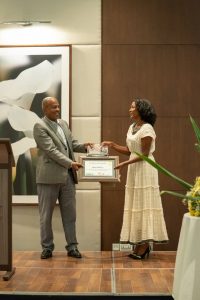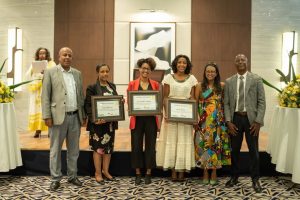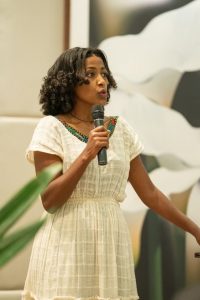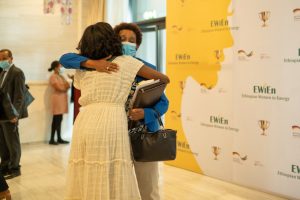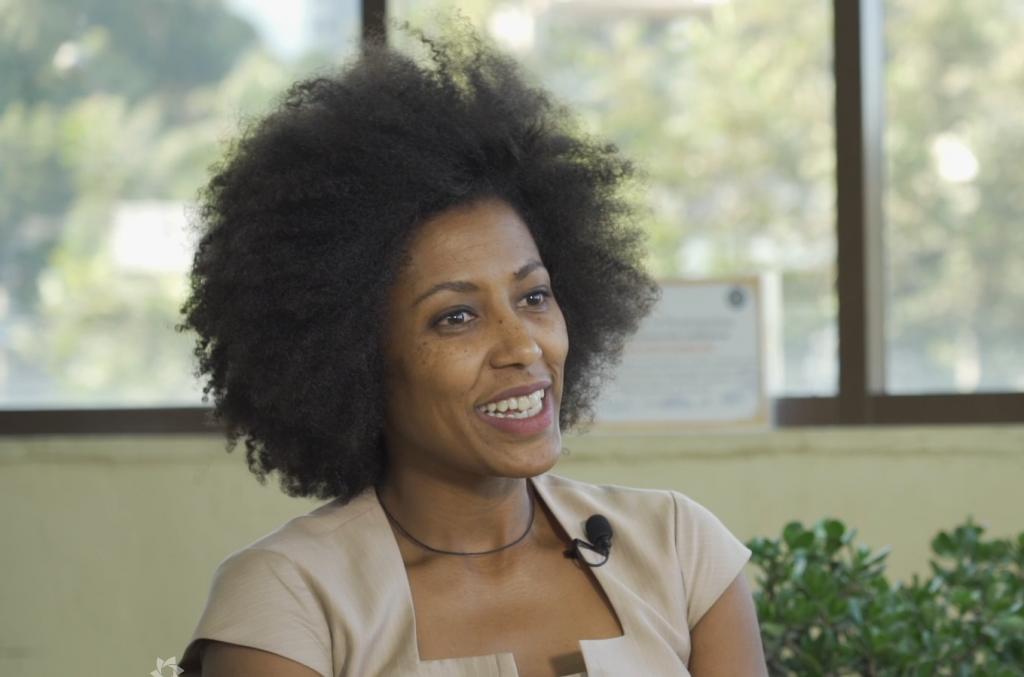
Rekik Bekele – Founder and CEO of Green Scene Energy PLC
Rekik Bekele is an entrepreneur who is the founder and CEO of Green Scene Energy plc. Green scene energy plc works on solar systems especially solar home systems for off-grid communities.
Rekik Bekele is one of the awardees of the Influential Women in Energy Award of the year 2021.
Rekik Bekele is an electrical engineer with 10+ years of experiences. She started her career in a company that does building installation, design, and supervision. Her first field experience in this company was supervising the electrical installation for building project at Axum University.
She then joined a project in solar energy, which was run by a company called SOLAR23. She worked as a technical, sales and marketing expert. Her first project with SOLAR23 was the electrification of a health center in Koda, a small kebele located between Mizan Tepi and Bonga. Rekik developed an interest in solar electrification while working on this project and she says that this project formed the basis for her career. After the SOLAR23 projects, Rekik joined Plan international and worked on community-managed renewable energy project in Lalibela for one year. The project’s goal was to install solar systems for water pumping, local clinics, schools, and hospitals. After getting back to Addis Ababa, she joined GIZ and worked there for a year. In GIZ, she was an energy advisor and worked on market development projects for mini-grids, micro-hydro power, solar systems, and improved cooking stoves. In 2014, Rekik worked on the Solar kiosk project. The project setup 13 kiosks around Ethiopia, which were solar-powered and sold solar products. The kiosks also provided maintenance and promotion for the community. Women were in charge of the Kiosks. As a result, Rekik recruited and trained local women to work in the kiosks.
Rekik founded her first company in 2014 called RK renew lighting and cooking PLC in 2014 with her partner. There was a lack of supply of the inner cladding of the stoves, and the company’s business model was built around solving this shortage. RK renew produced improved cooking stoves by traditionally making stove liners. It sold the liners to World Vision. However, Rekik was not convinced that the project would be sustainable as she believes that most charity-supported projects fail because the artificial market created for them. RK renew failed only after one year in 2015 due to failure in the partnership and not due to a financial failure. She described the situation as emotionally upsetting because she exerted all her efforts and energy into the success of the company.
Green Scene, Rekik’s second company, was founded in 2017, and it celebrates its fifth-year anniversary this November. Green scene energy plc works on solar systems especially solar home systems for off-grid communities. In addition to installing solar home systems for rural communities, Green Scene also wants to work on solar water pumping systems and productive systems that the rural community can benefit from, such as cooling systems, agro-processing -industry systems.
Rekik, while working on multiple projects, had played various leadership roles. She says that most of her work was done in teams. The project at Plan International in Lalibela was community-managed renewable energy, with the goal of the community maintaining the project after the program was completed. Therefore, she had to lead the community in sustaining the project. As the CEO of Green scene, she is part of the management team. She was also the manager at the RK renew. She was previously a team market developer in the solar Kiosk and a market development advisor in GIZ. She was also an Acumen leadership fellow in 2016. The fellowship focused on entrepreneurship which helped her build her leadership skill.
Rekik describes Green scene’s growth as slow but steady. The first year, 2017, was spent establishing the company, selecting products, testing products, and looking for partners. During this year there were three employees, including her. In the second year, 2018, they tried to attract some seed money and won some grants from power Africa to increase their capital, which enabled them to import products. So, they started selling some products. Green Scene achieved significant growth in 2019. In 2019 the number of employees grew from 3 employees to 13. Green scene’s turnover grew from 60,000 to 4 million birr. They sold 3000 products until March of 2020, which was the beginning of the corona pandemic. They had Gode airport solar installation project when the pandemic started. They lost a lot. They decreased the number of employees but, they still managed to survive. Green scene has been mainly working with Amhara, Oromia and SNNPR regions. In addition, they have been promoting in other regions such as Gambela, Somalia, Afar, and Dire Dawa.
Green Scene has tried different business models. Promoting the products by themselves and selling their products and using retailers by recruiting distributers for their products. Then they moved to collaborate with six micro finances by signing an agreement and working in more than four regions. They want to expand their reach throughout Ethiopia, and as microfinance has a limited reach, they are experimenting with pay as you go in collaboration with Telebirr, and have piloted the project.
Rekik explains that Green Scene operates to minimize risk. They reduce risk and loss by conducting research. They want to make sure that they are making a profit. They work by focusing on quality and profit. Moreover, they believe their sustainability is dependent on their partners like micro finances and retailers. They are attempting to improve their business model. They are constantly working on attracting investments to sustain the company’s growth and build the organization.
The Ethiopian national electrification program aims to reach 6 million households with solar and off-grid energy sources, and Green Scene aims to acquire 10% of the market or 600,000 households. They’ve already reached 5,000 people. To archive this, they aim to provide digitally managed solar energy solutions to their customers. They have also designed different strategies. They have signed an agreement with Ethio-telecom to work with them to use their sales outlet. In addition, they are attracting investments to build their capacity. They are also working with Pay as you go business solutions. Their project will launch latest December 2021. This project needs investment, and they have been looking for investors and inviting them.
Rekik says that she was able to see the difference she made through the SOLAR23 projects first hand. She said that before the project, the health centers in the Koda area lacked electricity, causing suffrage for patients, health workers, and pregnant women who came to the health center to give birth. There have been fires caused by kerosene lanterns. Women were forced to give birth in darkness with little help from health workers. She believes that their projects were able to solve these problems to some extent.
As an entrepreneur, she has created a job in the energy sector for several people. RK renew had 13 employees who all were females, while Green Scene had up to 16 employees before they were forced to reduce staff because of the pandemic as they were unable to travel and market their products. But sales are picking up now and she mentioned that they are going to hire more employees. In its five years existence, Green Scene has reached over 5000 people.
Currently, Green Scene employs nine people, of which four are women: two are in management positions and the other two work in accounting and sales and promotion. The plan for the company is to reach 50% women employees. The company has also used the EWiEn community to hire new staff. Green Scene encourages women to apply for the positions they present. Green Scene also provided internship opportunities for two students, of which one was a woman.
Rekik says that they provide quality products that minimize environmental impact. Providing quality products will help to increase the lifeline of the products and decrease waste products. They are also participating in collaboration with NGOs, government, and battery recycling companies to reuse and recycle the batteries. Green Scene is also planning to collect their products by incentives at the end of their lifetime by tracking them through Pay as you go. They also work on awareness creation. Green Scene organized an event called Run For trees. The event was organized to create awareness on environment protection, planting trees, cleaning. Around 300 people attended the event and planted 600 plants, and collected trash.
Rekik spoke on different events to motivate women. For example, she was a speaker at Debrebrehan University to share her experience and encourage female students. She also gave entrepreneurship training in TVET schools through WEDEP (women entrepreneur development program) for women startups. Rekik gives speeches voluntarily. She represents the private sector and participates in a panel discussion organized by the government, MOWIE.
Rekik was awarded Influential Women in Energy Award at the Annual Women In energy Event hosted by EWiEn. The award is presented to women who work in the energy sector that are to have impactful leadership roles in the sector and therefore can pave the way for the young generation to aspire a profession and leadership role in the energy sector.
Her work through her energy plc, Green Scene Energy has contributed to the Ethiopian energy sector
